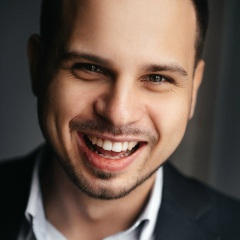https://facebook.com/298276320198577_3083585838334264
Сейчас в социальных сетях активно обсуждается идея проекта #заплатизадругого. Дело в том, что долги многих россиян проще вернуть, чем списать посредством процедуры банкротства: замысел состоит в следующем – каждый может пожертвовать посильную сумму, чтобы помочь выплатить задолженности тем, кто сам не справляется.
Пользователи, заинтересованные этой концепцией, фактически разделились на два лагеря: одни считают, что проект необходим: он поможет выбраться из долговой ямы огромному количеству граждан (которые по незнанию, из-за обмана, сложных жизненных обстоятельств оказались должны), другие полагают, что россияне будут злоупотреблять: пускать деньги не на погашение задолженностей или даже оформлять новые кредиты и займы.
«Кредитный Правозащитник» решил выяснить, как смотрит на происходящее автор идеи корпоративный коллектор и юрист Дмитрий Жданухин и собирается ли доводить задуманное до конца.
- Дмитрий, расскажите, как вообще пришла такая идея? Это лично Ваша задумка или Вы встречали что-то подобное в других сферах и решили адаптировать для проблемы закредитованности населения?
- В итоговом виде идея проекта #заплатизадругого пришла мне в ночь на рождество 2018 года. Однако, по сути, некоторые составляющие проекта я уже давно осознал и даже продвигал на семинарах. Например: - решение долговых проблем через помощь, а не давление (например, года 3-4 назад на семинаре в Корпоративном институте Газпрома я назвал сбор средств единственным вариантом решения долговой проблемы многодетной матери-одиночки с долгом за газ в 20 тыс. рублей); - информационную ценность и удобство Банка данных исполнительных производств; - возможность помощи самым разным людям в сложной ситуации, если правильно подать информацию (недавно вспомнил как Виртуальный клуб юристов (ЮрКлуб) лет 15 назад собрал пожилой женщине-юристу деньги на квартиру в российской глубинке). Самое главное в проекте – это объединение готовности помогать реально и проверено нуждающимся с 1) техническими возможностями Банка данных исполнительных производств, через который можно оплатить долг любого человека 2) возможностью сбора и распространения информации о нуждающихся через социальные сети с учетом специфики людей (их вероисповедания, социальных и прочих характеристик).
- Как планируется отбирать действительно нуждающихся? Есть какой-то алгоритм? Ведь желающих сыграть нуждающихся будет не меньше, чем самих нуждающихся
- Здесь основная идея – отбор нуждающихся уважаемыми общественными организациями – Русской православной церковью (РПЦ), Союзом армян России, объединениями чернобыльцев и т.д., например. Важно, что начать можно с районных отделений, церковных приходов и т.д., а потом распространить практику на всю организацию. К сожалению, конечно, исключить возможность обмана на все 100% будет нельзя.
- Планируете привлечь соратников?
- Конечно. Как ни странно, наиболее заинтересованы в этом проекте крупнейшие кредиторы – энергетики и другие ресурсоснабжающие компании, ведь они получат больше всего денег. Также проект актуален для приставов, т.к. позволит увеличить количество реально взысканных долгов. А для крупных общественных и религиозных организаций этот проект продолжить свою обычную благотворительную деятельность, но в более большем объеме. Это UBER для благотворителей, должников и кредиторов.
- Как Вы считаете, может ли реализация проекта спровоцировать волну злоупотреблений? Не исключена вероятность того, что граждане будут брать новые кредиты, понимая, что добрые люди всё выплатят за них. Если да, то как с этим бороться?
- Как ни странно, но если это случится, то я буду рад, т.к. волна злоупотреблений будет означать, что есть еще большее цунами случаев реальной помощи добросовестным должникам. Как человек работающий в коллекторской сфере я понимаю, что негативные аномалии могут привлекать внимание СМИ намного больше, чем постоянный «тихий» позитивный эффект.
- За счёт чего будет содержаться проект: техническое оснащение, контроль и т.д.?
- Проект так сделан, что он практически не требует внешних затрат. Все затраты или уже произвело государство – создав Банк данных исполнительных производств ФССП РФ (БДИП), или могут нести участники проекта добровольно. Например, те же межрегионгазы могут на своих сайтах размещать ссылки на реестры проверено добросовестных должников за газ, которым можно помочь.
- Будете ли рассчитывать на помощь государства (например, можно попробовать получить грант и т.д.)? → http://fgramota.ru/material/380-zaplatizadrugogo-intervyu-s-avtorom-proekta-dmitriem-zhdanuhinym
Хороший проект, что думаете?
P.S. Чтобы получить самые интересные посты за неделю, подпишитесь на дайджест КД → https://www.subscribepage.com/digest
(Илья Рабченок)
Сейчас в социальных сетях активно обсуждается идея проекта #заплатизадругого. Дело в том, что долги многих россиян проще вернуть, чем списать посредством процедур....
http://fgramota.ru/material/380-zaplatizadrugogo-intervyu-s-avtorom-proekta-dmitriem-zhdanuhinym?fbclid=IwAR1h0UKvjurCH6KQN2kjXHOeGqviWWYM50puLAccUaUShx3KDcRdmgq8CAQ
Сейчас в социальных сетях активно обсуждается идея проекта #заплатизадругого. Дело в том, что долги многих россиян проще вернуть, чем списать посредством процедуры банкротства: замысел состоит в следующем – каждый может пожертвовать посильную сумму, чтобы помочь выплатить задолженности тем, кто сам не справляется.
Пользователи, заинтересованные этой концепцией, фактически разделились на два лагеря: одни считают, что проект необходим: он поможет выбраться из долговой ямы огромному количеству граждан (которые по незнанию, из-за обмана, сложных жизненных обстоятельств оказались должны), другие полагают, что россияне будут злоупотреблять: пускать деньги не на погашение задолженностей или даже оформлять новые кредиты и займы.
«Кредитный Правозащитник» решил выяснить, как смотрит на происходящее автор идеи корпоративный коллектор и юрист Дмитрий Жданухин и собирается ли доводить задуманное до конца.
- Дмитрий, расскажите, как вообще пришла такая идея? Это лично Ваша задумка или Вы встречали что-то подобное в других сферах и решили адаптировать для проблемы закредитованности населения?
- В итоговом виде идея проекта #заплатизадругого пришла мне в ночь на рождество 2018 года. Однако, по сути, некоторые составляющие проекта я уже давно осознал и даже продвигал на семинарах. Например: - решение долговых проблем через помощь, а не давление (например, года 3-4 назад на семинаре в Корпоративном институте Газпрома я назвал сбор средств единственным вариантом решения долговой проблемы многодетной матери-одиночки с долгом за газ в 20 тыс. рублей); - информационную ценность и удобство Банка данных исполнительных производств; - возможность помощи самым разным людям в сложной ситуации, если правильно подать информацию (недавно вспомнил как Виртуальный клуб юристов (ЮрКлуб) лет 15 назад собрал пожилой женщине-юристу деньги на квартиру в российской глубинке). Самое главное в проекте – это объединение готовности помогать реально и проверено нуждающимся с 1) техническими возможностями Банка данных исполнительных производств, через который можно оплатить долг любого человека 2) возможностью сбора и распространения информации о нуждающихся через социальные сети с учетом специфики людей (их вероисповедания, социальных и прочих характеристик).
- Как планируется отбирать действительно нуждающихся? Есть какой-то алгоритм? Ведь желающих сыграть нуждающихся будет не меньше, чем самих нуждающихся
- Здесь основная идея – отбор нуждающихся уважаемыми общественными организациями – Русской православной церковью (РПЦ), Союзом армян России, объединениями чернобыльцев и т.д., например. Важно, что начать можно с районных отделений, церковных приходов и т.д., а потом распространить практику на всю организацию. К сожалению, конечно, исключить возможность обмана на все 100% будет нельзя.
- Планируете привлечь соратников?
- Конечно. Как ни странно, наиболее заинтересованы в этом проекте крупнейшие кредиторы – энергетики и другие ресурсоснабжающие компании, ведь они получат больше всего денег. Также проект актуален для приставов, т.к. позволит увеличить количество реально взысканных долгов. А для крупных общественных и религиозных организаций этот проект продолжить свою обычную благотворительную деятельность, но в более большем объеме. Это UBER для благотворителей, должников и кредиторов.
- Как Вы считаете, может ли реализация проекта спровоцировать волну злоупотреблений? Не исключена вероятность того, что граждане будут брать новые кредиты, понимая, что добрые люди всё выплатят за них. Если да, то как с этим бороться?
- Как ни странно, но если это случится, то я буду рад, т.к. волна злоупотреблений будет означать, что есть еще большее цунами случаев реальной помощи добросовестным должникам. Как человек работающий в коллекторской сфере я понимаю, что негативные аномалии могут привлекать внимание СМИ намного больше, чем постоянный «тихий» позитивный эффект.
- За счёт чего будет содержаться проект: техническое оснащение, контроль и т.д.?
- Проект так сделан, что он практически не требует внешних затрат. Все затраты или уже произвело государство – создав Банк данных исполнительных производств ФССП РФ (БДИП), или могут нести участники проекта добровольно. Например, те же межрегионгазы могут на своих сайтах размещать ссылки на реестры проверено добросовестных должников за газ, которым можно помочь.
- Будете ли рассчитывать на помощь государства (например, можно попробовать получить грант и т.д.)? → http://fgramota.ru/material/380-zaplatizadrugogo-intervyu-s-avtorom-proekta-dmitriem-zhdanuhinym
Хороший проект, что думаете?
P.S. Чтобы получить самые интересные посты за неделю, подпишитесь на дайджест КД → https://www.subscribepage.com/digest
(Илья Рабченок)
Сейчас в социальных сетях активно обсуждается идея проекта #заплатизадругого. Дело в том, что долги многих россиян проще вернуть, чем списать посредством процедур....
http://fgramota.ru/material/380-zaplatizadrugogo-intervyu-s-avtorom-proekta-dmitriem-zhdanuhinym?fbclid=IwAR1h0UKvjurCH6KQN2kjXHOeGqviWWYM50puLAccUaUShx3KDcRdmgq8CAQ
https://facebook.com/298276320198577_3083585838334264
Now on social networks, the idea of #platother project is being actively discussed. The fact is that the debts of many Russians are easier to repay than to write off through the bankruptcy procedure: the idea is as follows - everyone can donate a feasible amount to help pay debts to those who can not cope.
Users interested in this concept were actually divided into two camps: some believe that the project is necessary: it will help a huge number of citizens get out of the debt hole (who, due to ignorance, due to deception, due to difficult life circumstances, owed), others believe that the Russians will abuse: letting money not to pay off debts or even get new loans and borrowings.
“Credit Human Rights Defender” decided to find out how the corporate collector and lawyer Dmitry Zhdanukhin looks at what is happening on the idea and whether he is going to bring it to a conclusion.
- Dmitry, tell me how such an idea came about? Is this your idea personally or have you met something similar in other areas and decided to adapt it to the problem of the debt load of the population?
- In the final form, the idea of the #platz project of another came to me on the night of Christmas 2018. However, in fact, I have long realized and even promoted some of the components of the project at seminars. For example: - solving debt problems through help, rather than pressure (for example, 3-4 years ago at a seminar at the Gazprom Corporate Institute, I called fundraising the only way to solve the debt problem of a single mother with many children with a debt for gas of 20 thousand rubles); - information value and convenience of the Bank of data enforcement proceedings; - the ability to help a variety of people in a difficult situation, if you correctly submit the information (I recently recalled how the Virtual Club of Lawyers (YurKlub) collected money for an elderly woman lawyer for an apartment in the Russian outback 15 years ago). The most important thing in the project is the unity of readiness to help really and verified by those in need with 1) the technical capabilities of the Bank of enforcement proceedings, through which you can pay any person’s debt 2) the ability to collect and disseminate information about those in need through social networks, taking into account the specifics of people (their religion, social and other characteristics).
- How do you plan to select the really needy? Is there any algorithm? After all, there will be no less who want to play those in need than those in need
- Here the main idea is the selection of those in need by respected public organizations - the Russian Orthodox Church (ROC), the Union of Armenians of Russia, associations of Chernobyl victims, etc., for example. It is important that you can start with district offices, church parishes, etc., and then extend the practice to the entire organization. Unfortunately, of course, it will not be possible to exclude the possibility of cheating at 100%.
- Are you planning to attract associates?
- Of course. Oddly enough, the largest lenders - the energy sector and other resource supplying companies - are most interested in this project, because they will receive the most money. The project is also relevant for bailiffs, as will increase the number of actually collected debts. And for large public and religious organizations, this project will continue its usual charity work, but to a larger extent. This is UBER for benefactors, debtors and lenders.
- In your opinion, can the implementation of the project provoke a wave of abuse? It is possible that citizens will take new loans, realizing that good people will pay everything for them. If so, how to deal with it?
- Oddly enough, but if this happens, I will be glad, because a wave of abuse will mean that there is an even greater tsunami of cases of real help to bona fide debtors. As a person working in the collection field, I understand that negative anomalies can attract media attention much more than a permanent “silent” positive effect.
- Due to what will the project be contained: technical equipment, control, etc.?
- The project is made in such a way that it practically does not require external costs. All costs have either already been incurred by the state - by creating a data bank of enforcement proceedings of the FSSP of the Russian Federation (ODIHR), or project participants can bear voluntarily. For example, the same mezhregiongazy can place links on their websites to registries of verified bona fide debtors for gas, which can be helped.
- Will you count on state assistance (for example, you can try to get a grant, etc.)? → http://fgramota.ru/material/380-zaplatizadrugogo-intervyu-s-avtorom-proekta-dmitriem-zhdanuhinym
Good project, what do you think?
P.S. To get the most interesting posts of the week, subscribe to the CD digest → https://www.subscribepage.com/digest
(Ilya Rabchenok)
Now on social networks, the idea of #platother project is being actively discussed. The fact is that the debts of many Russians are easier to repay than to write off through procedures ....
http://fgramota.ru/material/380-zaplatizadrugogo-intervyu-s
Now on social networks, the idea of #platother project is being actively discussed. The fact is that the debts of many Russians are easier to repay than to write off through the bankruptcy procedure: the idea is as follows - everyone can donate a feasible amount to help pay debts to those who can not cope.
Users interested in this concept were actually divided into two camps: some believe that the project is necessary: it will help a huge number of citizens get out of the debt hole (who, due to ignorance, due to deception, due to difficult life circumstances, owed), others believe that the Russians will abuse: letting money not to pay off debts or even get new loans and borrowings.
“Credit Human Rights Defender” decided to find out how the corporate collector and lawyer Dmitry Zhdanukhin looks at what is happening on the idea and whether he is going to bring it to a conclusion.
- Dmitry, tell me how such an idea came about? Is this your idea personally or have you met something similar in other areas and decided to adapt it to the problem of the debt load of the population?
- In the final form, the idea of the #platz project of another came to me on the night of Christmas 2018. However, in fact, I have long realized and even promoted some of the components of the project at seminars. For example: - solving debt problems through help, rather than pressure (for example, 3-4 years ago at a seminar at the Gazprom Corporate Institute, I called fundraising the only way to solve the debt problem of a single mother with many children with a debt for gas of 20 thousand rubles); - information value and convenience of the Bank of data enforcement proceedings; - the ability to help a variety of people in a difficult situation, if you correctly submit the information (I recently recalled how the Virtual Club of Lawyers (YurKlub) collected money for an elderly woman lawyer for an apartment in the Russian outback 15 years ago). The most important thing in the project is the unity of readiness to help really and verified by those in need with 1) the technical capabilities of the Bank of enforcement proceedings, through which you can pay any person’s debt 2) the ability to collect and disseminate information about those in need through social networks, taking into account the specifics of people (their religion, social and other characteristics).
- How do you plan to select the really needy? Is there any algorithm? After all, there will be no less who want to play those in need than those in need
- Here the main idea is the selection of those in need by respected public organizations - the Russian Orthodox Church (ROC), the Union of Armenians of Russia, associations of Chernobyl victims, etc., for example. It is important that you can start with district offices, church parishes, etc., and then extend the practice to the entire organization. Unfortunately, of course, it will not be possible to exclude the possibility of cheating at 100%.
- Are you planning to attract associates?
- Of course. Oddly enough, the largest lenders - the energy sector and other resource supplying companies - are most interested in this project, because they will receive the most money. The project is also relevant for bailiffs, as will increase the number of actually collected debts. And for large public and religious organizations, this project will continue its usual charity work, but to a larger extent. This is UBER for benefactors, debtors and lenders.
- In your opinion, can the implementation of the project provoke a wave of abuse? It is possible that citizens will take new loans, realizing that good people will pay everything for them. If so, how to deal with it?
- Oddly enough, but if this happens, I will be glad, because a wave of abuse will mean that there is an even greater tsunami of cases of real help to bona fide debtors. As a person working in the collection field, I understand that negative anomalies can attract media attention much more than a permanent “silent” positive effect.
- Due to what will the project be contained: technical equipment, control, etc.?
- The project is made in such a way that it practically does not require external costs. All costs have either already been incurred by the state - by creating a data bank of enforcement proceedings of the FSSP of the Russian Federation (ODIHR), or project participants can bear voluntarily. For example, the same mezhregiongazy can place links on their websites to registries of verified bona fide debtors for gas, which can be helped.
- Will you count on state assistance (for example, you can try to get a grant, etc.)? → http://fgramota.ru/material/380-zaplatizadrugogo-intervyu-s-avtorom-proekta-dmitriem-zhdanuhinym
Good project, what do you think?
P.S. To get the most interesting posts of the week, subscribe to the CD digest → https://www.subscribepage.com/digest
(Ilya Rabchenok)
Now on social networks, the idea of #platother project is being actively discussed. The fact is that the debts of many Russians are easier to repay than to write off through procedures ....
http://fgramota.ru/material/380-zaplatizadrugogo-intervyu-s

У записи 1 лайков,
0 репостов,
148 просмотров.
0 репостов,
148 просмотров.
Эту запись оставил(а) на своей стене Илья Рабчёнок






















